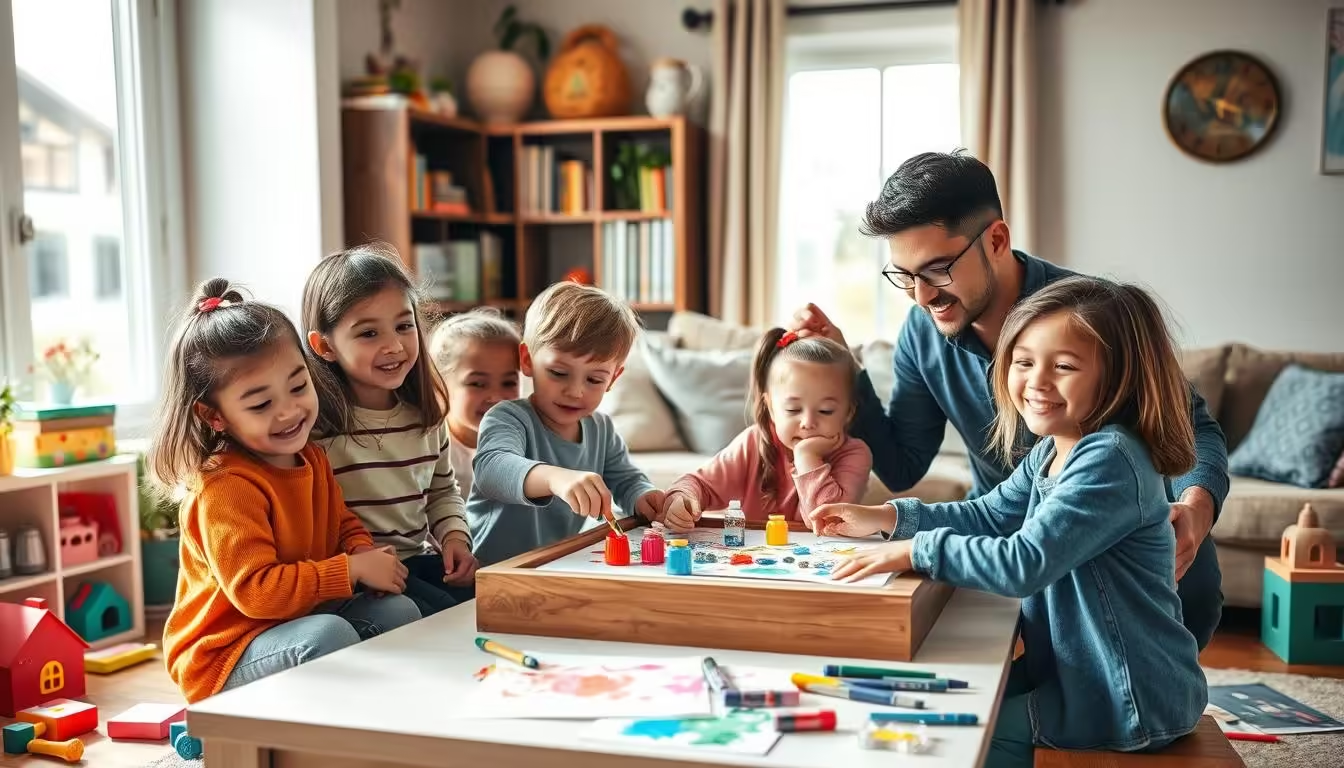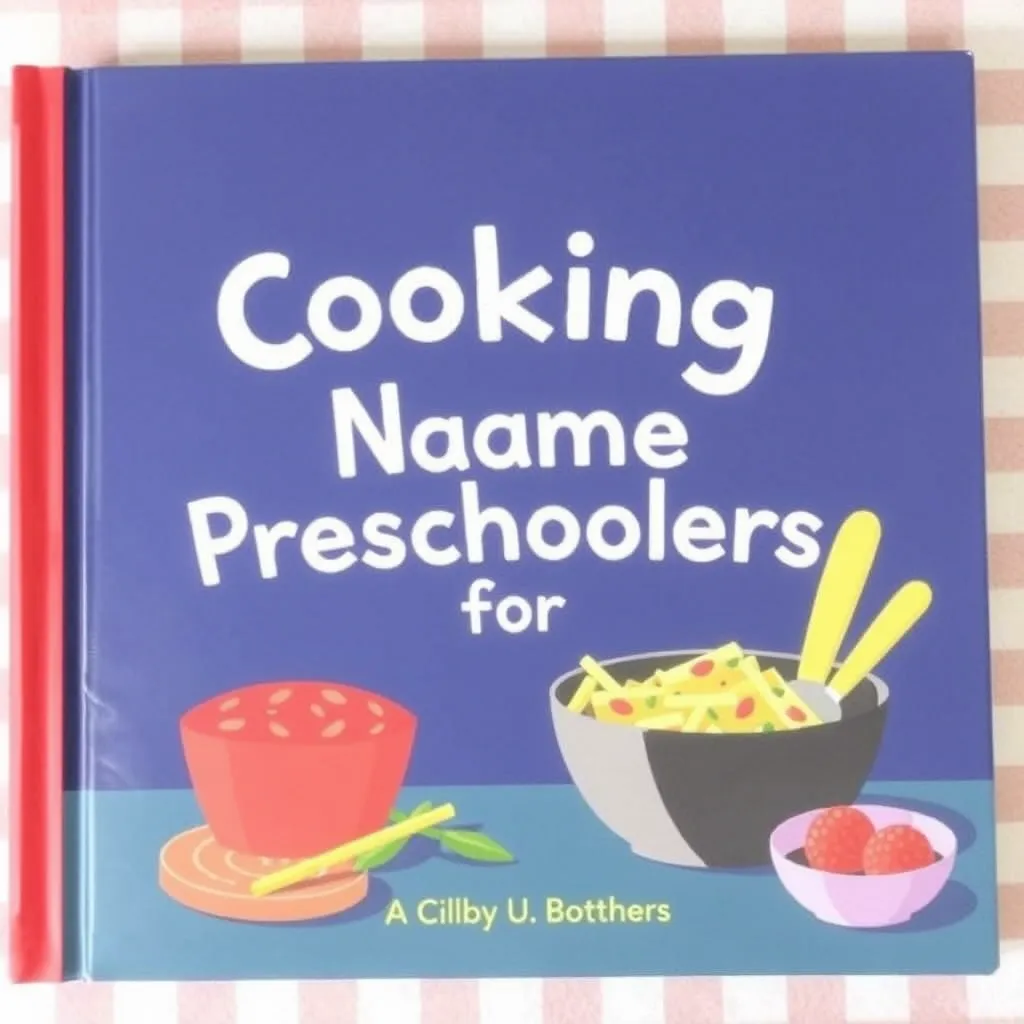Raising kids is a tough but rewarding job. Parents often feel unprepared for it. This article will share effective strategies for parenting elementary kids. We’ll cover communication, time management, and balancing discipline and support for your child’s success.
Key Takeaways
- Family involvement plays a crucial role in a child’s academic success.
- Regular parent-teacher conferences can help monitor a child’s progress.
- Schools offer accommodations for children with learning disabilities.
- Establishing a quiet study area and minimizing distractions can improve homework completion.
- Reading at home fosters language skills and a love for learning.
Table of Contents
Fostering Inner Efficacy in Children
As a parent, it’s key to help your child believe in their abilities. This belief is called inner efficacy. It’s important for their success and happiness. Children learn this from four main sources: their own success, seeing others succeed, positive feedback, and feeling calm.
The Importance of Inner Efficacy
A strong inner efficacy helps kids have a growth mindset. They see challenges as chances to learn and grow, not threats. This belief in themselves makes them more likely to keep trying and aim for bigger goals. It boosts their self-esteem and competence.
Four Sources of Inner Efficacy
- Experiencing Success: When kids succeed, they feel more confident in what they can do.
- Observing Others: Seeing others achieve goals inspires kids to believe they can too.
- Positive Reinforcement: Reminding kids of their past wins and encouraging them helps build their confidence.
- Calm Physiology: Teaching kids to manage stress helps them stay focused and positive.
Knowing these sources of inner efficacy helps parents support their children. It sets them up for a life of growth, resilience, and success.

Encouraging Effort and Evolution
As parents, we should focus on our children’s effort and growth, not perfection. When they make mistakes, don’t just say they’re wrong. Explain the issue and rephrase the instructions to help them understand.
Praise is powerful, but we must use it wisely. Saying “good job” or “you’re so smart” doesn’t really help. Instead, praise their specific efforts, persistence, creativity, and skills. This targeted praise boosts their efficacy and growth mindset.
Pointing Out Strategy
Help your child see how their actions lead to success. Highlight the strategies they used. This shows them the value of their efforts and problem-solving skills. It builds their confidence and self-awareness, key to inner efficacy.
“I noticed how you carefully planned out the steps to solve that math problem. Your strategy of breaking it down into smaller parts really paid off!”
Supporting your child’s effort and evolution boosts their efficacy and growth mindset. With constructive feedback, targeted praise, and highlighting strategies, you empower them. They’ll face challenges, learn from mistakes, and grow.

Boosting Your Child’s Self-Esteem
As a parent, you have a big role in shaping your child’s self-worth. Focus on positive reinforcement, building confidence, and creating a loving environment. Studies reveal that 83% of parents believe praising effort and progress is better than just results.
Encourage your child to explore and try new things. Kids learn fast and grow in confidence with new skills. Diversifying their skills makes them feel capable and boosts their self-assurance. When they face setbacks, remind them that learning from mistakes builds confidence.
Give your child chances to help and contribute. 52% of children feel more motivated to succeed when they help others. Giving them age-appropriate tasks makes them feel valued and connected.
“Recognizing and valuing children’s efforts, regardless of outcomes, enhances their self-worth.”
Most importantly, show your child unconditional love and support. 61% of children feel happier and more confident when they focus on their strengths. Accept their imperfections and let them know they are loved for who they are.

Catching Kids Being Good
As parents, we often criticize our kids more than we praise them. But the best way is to “catch kids being good.” This means noticing and praising the good behaviors we want to see more of. Giving rewards like love, hugs, and specific praise helps a lot in encouraging good behavior.
Studies show that positive parenting leads to success in kids. They do better in school, have fewer behavioral problems, and are mentally healthier. Positive parenting also helps the teenage brain, improving emotional and cognitive functions. Harvard research shows that positive parenting benefits last into adulthood, leading to better relationships and mental health.
The PRIDE skills are key in helping kids grow and behave well. These skills include Praise, Reflection, Imitation, Description, and Enjoyment. Specific strategies like praising small achievements and using physical gestures have been shown to positively influence kids’ behavior.
| PRIDE Skill | Description | Benefits |
|---|---|---|
| Praise | Providing positive feedback and recognition for good behavior | Reinforces desired actions, boosts self-esteem, and encourages continued growth |
| Reflection | Repeating or rephrasing children’s words to show engagement | Strengthens language development and communication skills |
| Imitation | Mimicking children’s actions and behaviors | Enhances social skills, self-esteem, and interactive play |
| Description | Describing children’s activities in detail | Improves attention span, focus, and vocabulary acquisition |
| Enjoyment | Expressing warmth, enthusiasm, and positivity during interactions | Strengthens the parent-child bond and fosters a positive emotional environment |
By praising good behavior right away, parents can reduce bad behavior and encourage good actions. It’s important to give specific praise to make sure kids know what they did right. Praising effort, not just results, helps kids keep trying.
It’s also key to praise new positive behaviors to encourage them. Instead of using money, focus on praising self-motivation.

Using tools like the “Our Good Week” Chart can help in praising good behavior. By focusing on praising good behavior, parents can create a supportive environment for their kids’ growth.
Setting Limits and Consistent Discipline
Discipline is key for kids in elementary school. It helps them learn self-control and make good choices. Clear rules and sticking to consequences are essential. Being consistent is crucial to make discipline work.
Establishing House Rules
Begin by making a list of clear, simple rules with your child. These rules should be easy for them to understand. Letting your child help make the rules helps them feel responsible.
After setting the rules, make sure to follow them every time. This shows your child that rules are important.
Consistent Consequences
If your child breaks a rule, use the consequences you agreed on. These should fit the misbehavior and be fair. Don’t make promises you can’t keep, as it can hurt trust.
Stay calm and don’t argue when your child protests. Consistency teaches self-control and responsibility. This can improve behavior and strengthen your bond with your child.
“Effective discipline should be given by an adult with an affective bond to the child, consistent, close to the behavior needing change, perceived as ‘fair’ by the child, developmentally and temperamentally appropriate, and self-enhancing.”
Every child is different, so you might need to adjust your approach. If you’re unsure, talk to experts for help.
Making Time for Your Kids
Finding quality time for your kids can be tough in today’s fast-paced world. But, it’s key for building strong family ties and supporting your child’s happiness. Simple acts like sharing breakfast, going for a walk, or having a weekly “family night” can really help.
Even busy parents can make a big difference with small, thoughtful moments. Making family time a top priority helps your child feel loved, heard, and connected. This strengthens your bond, boosts their confidence, and helps them emotionally.
- Set aside a weekly “family night” for fun activities like game nights, movie nights, or cooking together.
- Make physical activities part of your routine, like walking after dinner or playing sports in the backyard.
- Replace screen time with hands-on activities, such as reading, playing board games, or doing creative projects.
- Get involved in your child’s hobbies, whether it’s video games, drawing, or sports.
- Use commute time for talking, playing word games, or listening to audiobooks together.
The quality of time with your kids matters more than how much time you spend. By choosing wisely and focusing on family connection, you create a supportive environment for your child’s growth and happiness.
“The most important thing that parents can do is to be present with their children. It’s not about the number of hours you spend, but the quality of the time you give them.”
| Activity | Benefits |
|---|---|
| Family Meals | Promotes communication, bonding, and healthy eating habits |
| Outdoor Adventures | Encourages physical activity, exploration, and appreciation for nature |
| Game Nights | Fosters problem-solving skills, healthy competition, and quality time together |
| Reading Together | Boosts literacy, imagination, and parent-child connection |
Being a Good Role Model
As parents, we are the main role models for our kids. What we say and do greatly affects their behavior, respect, kindness, honesty, and character. It’s key to be aware of the role model we are and aim to show the traits we want in our children.
Children learn a lot by watching their parents. By showing respect, friendliness, honesty, and kindness, we teach them important lessons. Also, being unselfish and treating our kids well helps shape their attitudes and actions.
It’s not just about what we say, but how we act. Our kids watch and learn from our behavior. Being a good role model teaches them valuable life lessons. It helps them grow into respectful, caring, and responsible people.
“The greatest gift you can give your child is to be a good role model.” – Unknown
Remember, our actions are more powerful than our words. By showing the behavior we want in our children, we encourage their respect, kindness, honesty, and unselfishness. This sets them up for a successful and fulfilling life.
Prioritizing Communication
Good communication is key to being a great parent. As a parent of an elementary school kid, it’s important to explain expectations, talk about problems, share feelings, and ask for their ideas. This helps kids understand why we have rules and make decisions.
Involving children in decision-making and negotiating with them can make them more willing to cooperate and work hard.
Explaining Expectations
It’s crucial for parents and kids to know what’s expected at school and home. Communicating clearly about schoolwork, behavior, and home life can avoid confusion. It also helps create a peaceful place to learn.
Regularly checking and updating expectations keeps things consistent and fair.
Involving Kids in Decisions
Instead of just telling kids what to do, parents should ask for their thoughts and ideas. This way, kids feel more in control, learn to make decisions, and feel responsible together. When kids feel heard, they’re more likely to follow the plans they helped make.
| Communication Strategies | Benefits |
|---|---|
| Explaining Expectations | Prevents misunderstandings, promotes consistency |
| Involving Kids in Decisions | Empowers children, develops decision-making skills, fosters cooperation |
Good communication and collaboration between parents and kids is the base of a strong and positive relationship. By focusing on these, parents can create a caring space that helps their kids grow and develop.
Adjusting Your Parenting Style
Parenting changes as kids grow. Parents must adapt their ways. Changing your expectations and adjusting your child’s space can help reduce stress for everyone.
Being flexible and open to adapting your parenting style is key. Each child is different. Older kids need less guidance, while younger ones might need more direction.
Personal experiences can lead to changes in parenting style. Changing how you parent can improve your bond with your child. Apologizing for past mistakes can also help your relationship.
Love, time, and attention are vital in parenting. Focusing on these can shape your parenting style. This creates a supportive environment for your child to grow.
- Authoritative Parenting: It mixes warmth and clear rules. Kids grow up confident and responsible.
- Permissive Parenting: It has low expectations and less discipline. Kids may feel good about themselves but struggle with self-control.
- Authoritarian Parenting: It’s strict with high expectations. Kids might fear punishment and lack social skills.
Knowing about parenting styles and being ready to adjust your approach helps. This way, you can support your child’s growth in a positive environment.
Unconditional Love for Your Child
As parents, we must guide and discipline our children with care. It’s important to do this in a way that encourages and supports, not blames. Showing your child that your love is unconditional, even when they misbehave, builds a strong bond.
It can be hard to show unconditional love, especially when kids test boundaries. Societal norms and what we think kids should be like can make it tough. But, it’s crucial to accept and love our kids for who they are.
Your child’s value isn’t based on what they achieve or do. Unconditional love means accepting your child for who they are, not just what they do. This helps them feel good about themselves and follow their own path.
“You can’t stop my love for you, no matter what you do.”
Setting boundaries and discipline are key, but they should be rooted in love and support. When kids feel loved no matter what, they feel secure and confident. They’re more likely to explore and dream big.
Unconditional love doesn’t mean you won’t guide or have high standards. It means your love isn’t based on their success or obedience. It’s the kindness and compassion every child deserves.
Your child’s happiness isn’t just about achievements. It’s about growing strong, creative, and self-assured. By loving them unconditionally, you give them the best chance to succeed.
“You can’t stop my love for you, no matter what.”
Parenting is tough, but with patience and love, you can help your child thrive. The unconditional love you give will be a lifelong gift.
parenting elementary kids: Knowing Your Limitations
As parents, it’s key to know our own strengths and weaknesses. Understanding our limits helps us set realistic goals for ourselves, our partners, and kids. This self-awareness lets us improve and become better parents.
Setting limits and boundaries for kids is crucial. Studies show that nonverbal cues carry significant importance in this process. We must use a warm but firm tone to clearly communicate what’s expected and what happens if not. It’s also vital to have expectations that match each child’s age.
Discipline should aim to stop harmful behavior or prevent it in the future. However, research has shown that 75% of all ‘misbehavior’ in children can be attributed to the disciplinary methods employed by the caregiver. So, discipline should focus on building a relationship, not just setting limits.
- Aim to eliminate wishy-washy language in directives and setting limits.
- Ensure that your tone is warm but firm to avoid over-stimulation in children.
- Have developmentally appropriate expectations for children of various ages.
- Be physical only when necessary and always in a calm manner.
- Don’t explain the reason for a limit more than once to avoid irritation.
- Use humor as an effective tool in setting limits and boundaries with children.
By recognizing our own limitations and working on our strengths, we can become more effective and resilient parents. We can then provide the support and guidance our children need to thrive.
“According to Dr. Thomas Gordon’s Parent Effectiveness Training (P.E.T.), the phrase ‘setting limits’ is a concern in parenting literature and raises objections. Dr. Thomas Gordon advocates for an inclusive, relationship-based approach to parenting instead of ‘setting limits.’”
Developing a School Partnership
As a parent, one of the most important steps you can take is to build a strong partnership with your child’s school. This means talking regularly and getting involved with teachers and the school community.
Meeting Teachers
It’s key to have a good relationship with your child’s teachers. Try to go to parent-teacher conferences. There, you can talk about your child’s progress and how they can improve.
Be open and work together with the teacher. This way, you can support your child’s learning and growth.
Attending Conferences
Don’t just go to parent-teacher conferences. Also, attend other school events like open houses or curriculum nights. These are great chances to learn about your child’s schoolwork and how you can help at home.
Even if you don’t speak the same language, it’s important to talk to school staff. Your involvement is key to your child’s success.
Studies show that when schools, parents, and communities work together, students do better. This teamwork helps students achieve more and stay motivated. It’s a strong start for future success.
| Benefit | Impact |
|---|---|
| Higher Grades | Students achieve better academic results when parents and schools collaborate. |
| Improved Academic Outcomes | Family-school partnerships lead to enhanced social-emotional and academic functioning. |
| Increased Motivation | Collaborative efforts between families and schools decrease disruptive behavior and the risk of conduct problems and substance abuse in later life. |
Developing a strong school partnership is crucial for supporting your child’s educational journey and helping them reach their full potential.
Supporting Academics at Home
As a parent, you are key in helping your child succeed in school. By keeping an eye on their progress and helping with homework, you help them grow. This support is crucial for their academic development.
Monitoring Progress
It’s important to check in on your child’s school work regularly. Look at their assignments, test scores, and teacher feedback. This helps you see where they’re doing well and where they might need help.
By spotting any learning gaps early, you can help them stay on track. This ensures they don’t fall behind.
Helping with Homework
Homework is a great way to reinforce what they learn in class. But it can also be frustrating. Create a quiet study area and set aside time each day for homework.
Be there to guide and encourage them, but let them do the work themselves. If they’re struggling, look into tutoring or other academic support. This can help with learning disabilities.
| Statistic | Implication |
|---|---|
| Reading aloud every night is emphasized as a key activity to support children’s learning at home. | Engaging in read-aloud activities can enhance a child’s literacy development and language skills. |
| The Mental Math Car Ride Game encourages parents to engage in math activities with their children using real-world examples. | Incorporating math-based games and activities into daily routines can help children develop numeracy skills and problem-solving abilities. |
| Engaging in storytelling as a family activity is highlighted to promote creativity and communication skills. | Encouraging storytelling and narrative development can foster a child’s imagination, language proficiency, and social-emotional learning. |
By watching your child’s progress and helping with homework, you give them the support they need. Your involvement and dedication can greatly impact their academic journey.
Getting Involved in School Activities
Being a parent of an elementary school student means you can make a big difference. Your involvement in school activities helps your child grow both academically and socially. It shows your child how much you value education.
One great way to get involved is by volunteering in the classroom. You can help the teacher with tasks like organizing materials or leading discussions. This not only helps the teacher but also lets you see what your child is learning.
- Research shows that more parental involvement leads to fewer absences. This is good for both learning and grades.
- Studies find that kids of involved parents do better in school. This shows how important it is to be involved.
- Teachers benefit from parental involvement too. It builds respect and helps them understand their students better.
Joining the parent-teacher group (PTG) or parent-teacher association (PTA) is another good option. These groups let you help make decisions, plan events, and support school projects. Being part of the PTG or PTA means you can share your ideas and help make the school better for everyone.
| Involvement Strategy | Impact |
|---|---|
| Inviting parents to be weekly Mystery Readers | Enabled every student to have a family member visit the classroom |
| Assigning classroom tasks like organizing the library to volunteers | Lightened the teacher’s workload and fostered a sense of ownership in the classroom environment |
| Inviting parents to serve as academic coaches, volunteering during specific activities | Increased individualized attention for students and enhanced caregivers’ understanding of their child’s learning process |
Going to school events and performances shows you care. Whether it’s a science fair or a sports game, being there matters. It boosts your child’s confidence and shows how much you value their education.
“Intensely involved parents have children with higher test scores across all subjects, highlighting the impact of parental engagement on student achievement.”
By getting involved, you support your child’s education and help the whole school community. Your efforts can strengthen relationships with teachers and other parents. This creates a better learning environment for everyone.
Encouraging Learning at Home
As a parent, you are key in helping your child learn at home. Keep a positive view of education. Watch how much media they use. Encourage reading and talking. Use the library to help their learning.
Positive Attitude Toward Education
Children do well when they see their parents love learning. Show real interest in school topics. Celebrate their successes to make learning fun.
Monitoring Media Use
Today, it’s vital to watch how much media your child uses. Make sure they balance screen time with hands-on activities. This helps them think and solve problems.
Encouraging Reading
Reading is key for thinking and speaking skills. Make reading a family habit. Go to the library and give them books they can understand.
Talking with Your Child
Talking with your child helps them learn. Encourage them to share and ask questions. Listening and answering helps them grow intellectually.
Using the Library
The library is full of learning chances. Use books, programs, and expert advice to help your child. It can spark their creativity and love for reading.
| Resource | Description |
|---|---|
| Oxford Owl | Free e-books and math games and activities for grades PreK-6 |
| Mystery Science | Science lessons for grades K-5 |
| ABC Mouse | Reading and math games and activities for grades PreK-6 |
| Khan Academy | Lessons on grammar, science, history, and math for grades K-12 |
By using these tips, you can make your home a place of learning. This will help your child succeed in school.
“The more that you read, the more things you will know. The more that you learn, the more places you’ll go.”
Conclusion
Parenting elementary kids needs a full plan that covers their school, social, and emotional needs. By using the tips in this article, like boosting self-confidence and setting clear rules, you can help your kids do well in school and life. This includes making learning fun at home and talking often with your child.
Being involved in your child’s education is key, no matter your background or where they go to school. Kids with active parents do better in school and life. It’s important to make your home a place where learning is encouraged, set high but reachable goals, and stay in touch with your child’s school.
By following these parenting elementary kids tips, you can improve your child’s social skills, reduce bad behavior, and help them do well in school. Your hard work and care will help your child feel confident, make friends easily, and succeed in school and later on. Remember, helping your child grow is a team effort. Working with teachers, you can help your child reach their highest potential.
FAQ
What is the importance of fostering inner efficacy in children?
Inner efficacy is key for a child’s growth. It’s about believing in their ability to reach their goals. Success, seeing others succeed, remembering past wins, and feeling calm all help build it.
Teaching a growth mindset and self-soothing can also boost it.
How can parents encourage their children’s effort and evolution?
Parents should focus on effort and growth, not perfection. When correcting mistakes, explain and rephrase instead of just saying it’s wrong. Praise specific efforts, persistence, and creativity.
Helping kids see how their actions lead to success also boosts their confidence.
What strategies can parents use to boost their child’s self-esteem?
A child’s self-image is shaped by what parents say and do. Praise their achievements, give them independence, and avoid putting them down. It’s also important to show them that mistakes are okay and they’re loved no matter what.
How can parents effectively discipline their children?
Discipline helps kids learn right from wrong and control themselves. Set clear rules and stick to consequences like time-outs or losing privileges. Being consistent is key to effective discipline.
How can parents make time for their children?
Finding time for kids is tough, but it’s vital. Simple things like breakfast together, walks, or family nights can create bonding moments. Even small interactions can make a big difference for working parents.
Why is it important for parents to be good role models?
Kids learn a lot from watching their parents. Parents should show the traits they want their kids to have, like respect and kindness. Being selfless and treating kids well is also important for setting a good example.
How can parents prioritize communication with their children?
Good communication is essential for parents. Explain expectations, describe problems, and share feelings. Letting kids contribute to solutions helps them understand rules and decisions.
Involving kids in decisions and negotiating can also improve cooperation and motivation.
Why is it important for parents to adjust their parenting style as their children grow?
Parents must adapt their style as kids change. Recognizing unrealistic expectations and adjusting the environment can reduce frustration. Being flexible and open to change is crucial for effective parenting.
How can parents support their children’s education at home?
Parents can support learning at home in many ways. Maintain a positive view of education, monitor media, encourage reading, and have regular conversations. Using library resources can also help reinforce learning and support school skills.











